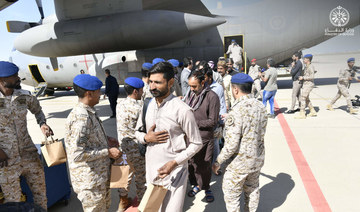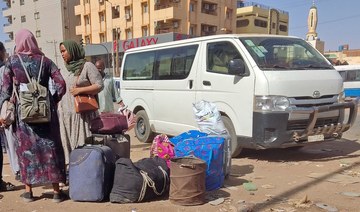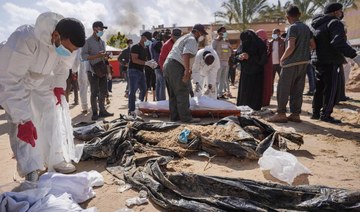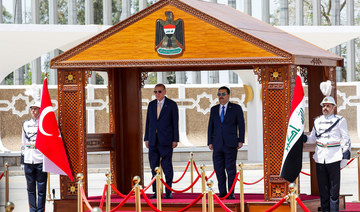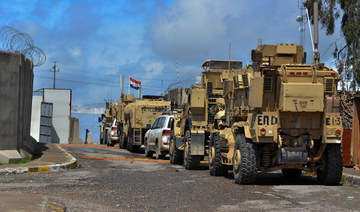KHARTOUM: The war between Sudan’s generals is having increasingly severe consequences for civilians, with a doubling over the past week of the number uprooted from their homes, the United Nations said on Tuesday.
Hundreds have been killed so far. New worries emerged as separate ethnic clashes claimed at least 16 lives in the country’s south, and a powerful group in the east — so far untouched by the war — demonstrated in support of the army.
More than 700,000 people are now internally displaced by battles since April 15, according to the International Organization for Migration.
“Last Tuesday, the figure stood at 340,000,” the UN agency’s spokesman, Paul Dillon, said in Geneva.
An increasing number are also crossing borders to escape the conflict between forces loyal to army chief Abdel Fattah Al-Burhan, and his former deputy Mohamed Hamdan Daglo who commands the paramilitary Rapid Support Forces (RSF).
Fighting has been concentrated in the capital Khartoum but other areas, particularly the western Darfur region bordering Chad, have also seen heavy fighting.
The UN refugee agency said on Monday that 150,000 Sudanese had fled to neighboring countries.
Those left behind in the war zones face shortages of water, electricity, food and medical care in a country where, according to the UN, about one-third of the population needed humanitarian assistance even before fighting began.
Foreign-led evacuations by land, sea and air have seen thousands more depart, many via Port Sudan on the Red Sea, which has so far remained peaceful.
A demonstration on Monday in support of the army, which some called on to arm civilians, raised alarms in the country already marked by a history of ethnic unrest.
“One army, one people,” hundreds of protesters belonging to the Beja people chanted.
They also called “no to negotiations,” a reference to truce talks happening across the sea in the Saudi city of Jeddah between representatives of Burhan and Daglo.
Those talks, also backed by the United States, have yielded no progress as fighting continues.
The top UN aid official, Martin Griffiths, has now left Jeddah after he “proposed a declaration of commitments for the two parties to guarantee the safe passage of humanitarian relief,” a UN spokesman in New York said.
Analysts see a protracted fight between the generals, with the potential for broader conflict.
“As the war drags on... there is a growing risk that people might start arming themselves locally, or the army might resort to raising a counter-militia to the RSF, or both,” Magdi el-Gizouli of the Rift Valley Institute told AFP.
Even before this war, Sudan suffered localized conflicts that last year killed about 900 people, according to the UN.
Those conflicts are often over access to scarce water and other resources, but they also reflected a security breakdown since Burhan and Daglo staged a coup in October 2021, derailing a transition to democracy after the toppling of longtime autocrat Omar Al-Bashir.
The two generals later fell out in a power struggle, leading to the current fighting.
State media reported on Tuesday deadly clashes in Kosti, the White Nile state capital and last major town on the road from Khartoum leading to South Sudan.
The fighting on Sunday between the Hausa and Nuba ethnic groups killed 16 people, wounded scores more and prompted a regional night-time curfew, state-run SUNA news agency said.
The UN has described Sudan’s humanitarian situation as catastrophic.
Aid facilities have faced “large-scale looting,” including most recently at the World Food Programme in Khartoum over the weekend, a UN spokesperson said on Monday.
“Certain banks in Khartoum” have also been looted, Sudan’s banking federation said on Tuesday, assuring Sudanese that their savings remain unaffected.
As representatives in Saudi Arabia seemed no closer to an agreement, “various types of weapons were fired” in northern Khartoum on Tuesday, according to a resident of the Shambat area.
Another witness reported continued clashes in the capital’s south.
The Sudanese foreign ministry said army chief Burhan had received calls on Tuesday from Turkish President Recep Tayyip Erdogan and Azali Assoumani of the Comoros, the current chairman of the African Union.
According to the ministry’s statement, Assoumani “will send a special envoy to Jeddah to help reach an agreement to end the crisis and restore stability in Sudan.”
The African Union — which suspended Sudan following the 2021 coup — and East African regional bloc IGAD have pushed for discussions mediated by South Sudan’s President Salva Kiir.
Concerns have grown over the conflict’s impact on South Sudan, whose oil is exported through its northern neighbor.
Hanna Tetteh, United Nations’ special envoy for the Horn of Africa, told the Security Council that more than 200,000 South Sudanese refugees hosted by Sudan could potentially return south, “if we do not see stability returning soon.”
Sudanese war displaced double to more than 700,000: UN
https://arab.news/4ryqh
Sudanese war displaced double to more than 700,000: UN
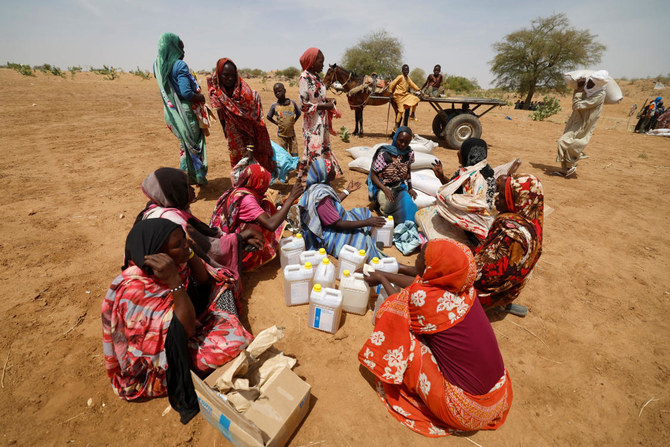
- Hundreds have been killed in the clashes so far
- Foreign-led evacuations by land, sea and air have seen thousands depart
Israeli military rejects allegations of burrying Palestinians in mass graves at Gaza hospital
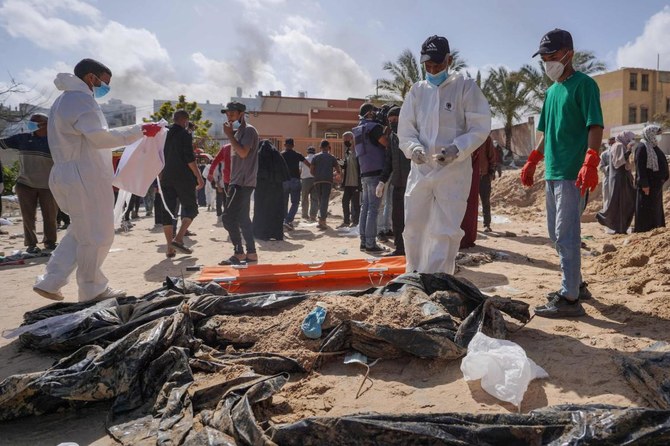
GENEVA: Israeli military on Tuesday rejected allegations that its forces buried Palestinians in mass graves at a Gaza hospital, after the United Nations called for international investigation into the deaths during Israeli sieges, saying war crimes may have been committed.
In a statement, the military said corpses already buried at Nasser hospital were examined as part of search for hostages.
The UN rights office said it was “horrified” by the destruction of Gaza’s biggest hospital, Al-Shifa in Gaza City, and its second largest, the Nasser Medical Complex in Khan Yunis.
On Monday, the Palestinian territory’s Civil Defense agency said health workers had uncovered more than 200 bodies of people killed and buried at Nasser hospital, which was besieged by Israeli troops last month.
In early April the World Health Organization said Al-Shifa had been destroyed by an Israeli siege, leaving an “empty shell” containing many bodies.
The UN rights office on Tuesday demanded “independent, effective and transparent investigations into the deaths.”
“Given the prevailing climate of impunity, this should include international investigators,” UN rights chief Volker Turk said in a statement.
Hospitals, which are protected under international law, have repeatedly come under Israeli bombardment over more than six months of war in Gaza.
Israel has accused Palestinian militant group Hamas of using Gazan medical facilities as command centers and to hold hostages abducted during its attack inside Israel on October 7.
Hamas has denied those claims.
International law violations
“Hospitals are entitled to very special protection under international humanitarian law,” Turk pointed out.
“And the intentional killing of civilians, detainees and others who are hors de combat is a war crime.”
The UN rights office said it did not have access to independent information as to what had transpired at the two hospitals.
But spokeswoman Ravina Shamdasani said efforts were under way to corroborate reports and details given by Gaza authorities.
The latter say 283 bodies were recovered from Nasser hospital, including 42 that had been identified.
“Victims had reportedly been buried deep in the ground and covered with waste,” she told reporters in Geneva.
Older people, women and wounded were reportedly among the dead, she said.
Others were allegedly “found with their hands tied and stripped of their clothes.”
As for Al-Shifa, the Israeli army has said around 200 Palestinians were killed during its military operation at the hospital
Shamdasani pointed to reports indicating that this toll “may be an underestimate.”
Around 30 bodies were reported found buried in two graves in the courtyard of Al-Shifa hospital.
“And there are reports that the hands of some of these bodies were also tied,” Shamdasani said.
So far, she said, the UN “can’t corroborate the exact figures” of people killed at the two hospitals, underlining: “This is why we are stressing the need for international investigations.”
“Clearly there have been multiple bodies discovered,” she said.
The reports that some had their hands tied indicated “serious violations” of international law, she added.
“These need to be subjected to further investigation... They can’t just be more reports in this horrific war that just pass under the radar.”
Qatar Foreign Ministry: No justification to end Hamas’ presence in Doha
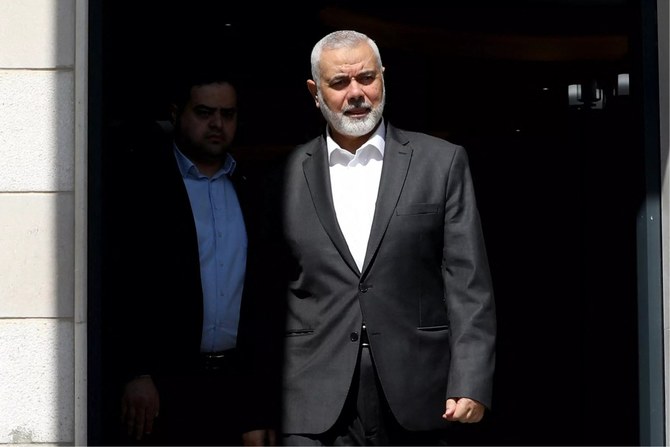
- Qatar said it was re-evaluating its role as mediator in ceasefire talks between Israel and the Palestinian group Hamas
DUBAI: Qatar said on Tuesday there was no justification to end the presence of an office for Palestinian militant group Hamas in Doha while its mediation efforts continued in the Gaza war.
Foreign Ministry spokesperson Majed Al-Ansari added in a press conference that Qatar remained committed to mediation but was reassessing its role in "frustration with attacks" on its efforts.
Last week, Qatar said it was re-evaluating its role as mediator in ceasefire talks between Israel and the Palestinian group Hamas, citing concerns that its efforts are being undermined by politicians seeking to score points.
Qatari Prime Minister Sheikh Mohammed bin Abdulrahman Al-Thani, who is also foreign minister, said there was a "misuse of this mediation for narrow political interests, and this necessitated Qatar to undertake a full evaluation of this role".
Turkiye’s Erdogan says Iraq sees need to eliminate Kurdish PKK militia
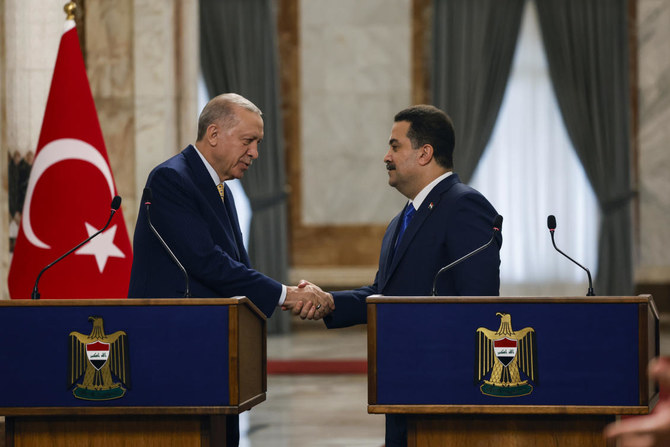
- Ties between the neighbors were entering a new phase after they agreed to cooperate against militants, boost economic ties
- Erdogan visited Iraq for the first time since 2011 following years of tensions as Ankara carried out cross-border attacks on PKK militants based in northern Iraq
ANKARA: Turkish President Tayyip Erdogan said in remarks published on Tuesday he believed Iraq saw the need to eliminate the Kurdish PKK militia and had the will to do so, adding Ankara wanted Baghdad’s support in that battle.
Erdogan was speaking after talks in Baghdad and Irbil on Monday, the first visit by a Turkish leader to Iraq since 2011, following years of tensions as Ankara carried out cross-border attacks on PKK militants based in northern Iraq.
Ties between the neighbors were entering a new phase, Erdogan said, after they agreed to cooperate against militants, boost economic ties via a new corridor and consider Iraq’s needs for access to scarce water.
Speaking to reporters on his flight back from Iraq, Erdogan said Turkiye’s battle with terrorism would continue in line with international law, and added he hoped to see concrete results of Baghdad labeling the PKK a “banned organization” last month.
The PKK, designated a terrorist group by Turkiye, the US and the European Union, took up arms against the Turkish state in 1984. More than 40,000 people have been killed in the insurgency.
The conflict was long fought mainly in rural areas of southeastern Turkiye but is now more focused on the mountains of northern Iraq’s mountainous, semi-autonomous Kurdistan region.
“One would hope that our neighbors put the necessary stance forward against the threats directed at us from their lands, and we continue this battle jointly,” Erdogan said, according to a text of the in-flight comments published by his office.
“Eliminating this threat is also to the benefit of Iraq. I believe they see this reality and they will now put forth a will for this issue to be removed,” he said, adding he also discussed steps against the PKK during talks in Irbil.
Asked about Iraq’s needs for access to water, Erdogan said Turkiye was not a country with abundant water resources and also had to manage its own needs. He added plans taking into account “changing climate conditions” were needed for the sustainable use of water.
“Therefore, we need to take cautious steps. With evaluations to be held in that direction, it may be possible to find common ground,” he said.
On Monday, the two countries agreed to a strategic framework agreement overseeing security, trade and energy as well as a 10-year deal on the management of water resources that would take Iraq’s needs into account.
Hezbollah launched drones at Israel bases after fighters’ killing
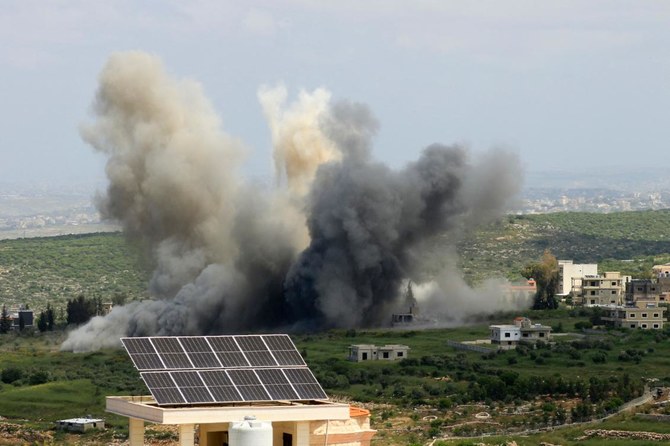
- The Lebanese group added the attack was “in response” to an Israeli drone strike that killed one of its members in south Lebanon
- Israeli army had said it killed “two significant terrorists in Hezbollah’s aerial unit”
BEIRUT: Lebanon’s Iran-backed Hezbollah movement said it launched drone attacks on two north Israel bases Tuesday in retaliation for the killing of a fighter Israel described as “significant.”
Since Hamas’s unprecedented October 7 attack on Israel triggered war in Gaza, there have been near-daily cross-border exchanges of fire between Hezbollah and the Israeli army.
But Hezbollah has stepped up its rocket attacks on Israeli positions in recent days, with the latest assault targeting beyond the border area that the group usually strikes.
Hezbollah launched “a combined air attack using decoy and explosive drones that targeted” two Israeli bases north of Acre, the group announced in a statement, while Israel said they did not hit their targets.
The Lebanese group added the attack was “in response” to an Israeli drone strike that killed one of its members in south Lebanon earlier in the day.
Israel’s army said it had “successfully intercepted two suspicious aerial targets off the northern coast.”
On Tuesday morning, a source close to Hezbollah told AFP an Israeli drone strike deep into Lebanon killed an engineer working for the group’s air defense forces as he was traveling in a vehicle.
The strike hit the Abu Al-Aswad area near the coastal city of Tyre, some 35 kilometers (22 miles) from the border, an AFP journalist reported.
The fighter’s vehicle was completely burnt out.
Hezbollah said one of its fighters had been killed by Israeli fire, adding he was a resident of the area where the vehicle was struck.
The group also said another fighter had been killed by Israel in a statement overnight.
Earlier Tuesday, the Israeli army had said it killed “two significant terrorists in Hezbollah’s aerial unit” on Tuesday morning and overnight.
The fighter killed Tuesday was “heavily involved in the planning and execution of terrorist attacks against Israel,” it added.
On Sunday evening, Hezbollah shot down an Israeli drone, both sides said.
Since October 7, at least 378 people have been killed in Lebanon, mostly Hezbollah fighters but also 70 civilians, according to an AFP tally.
Israel says 11 soldiers and eight civilians have been killed on its side of the border.
Israel military strikes northern Gaza in heaviest shelling in weeks
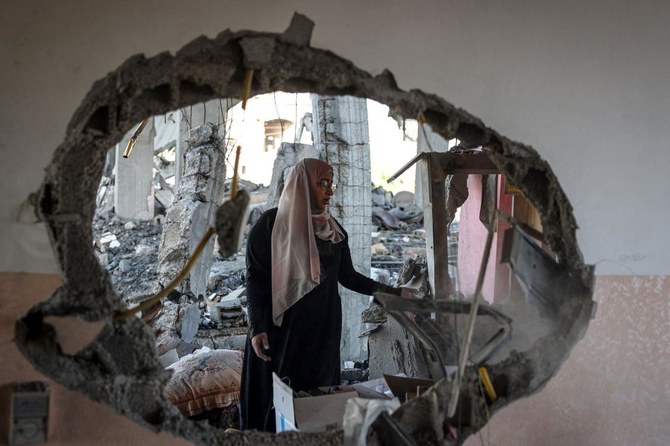
- Army tanks made a new incursion east of Beit Hanoun on the northern edge of the Gaza Strip, though they did not penetrate far into the city
- The renewed shelling and bombing of northern Gaza comes almost four months after the Israeli army announced it was drawing down its troops there
GAZA: Israel bombarded northern Gaza overnight in some of the heaviest shelling in weeks, causing panic among residents and flattening neighborhoods in an area from which the Israeli army had previously down its troops, residents said on Tuesday.
Army tanks made a new incursion east of Beit Hanoun on the northern edge of the Gaza Strip, though they did not penetrate far into the city, residents and Hamas media said. Gunfire reached some schools where displaced residents were sheltering.
In Israel, where government offices and businesses were shut to celebrate the Jewish Passover holiday, incoming rocket alerts sounded in southern border towns, although no casualties were reported.
The armed wing of Islamic Jihad, a group allied to Hamas, claimed responsibility for the rocket attacks on Sderot and Nir Am, indicating fighters were still able to launch them almost 200 days into the war, which has flattened large swathes of the enclave and displaced almost all of its 2.3 million people.
Thick black smoke could be seen rising in northern Gaza from across the southern Israeli border. Shelling was intense east of Beit Hanoun and Jabalia and continued on Tuesday morning in areas such as Zeitoun, one of Gaza City’s oldest suburbs, with residents reporting at least 10 strikes in a matter of seconds along the main road.
Just west of Beit Hanoun in Beit Lahiya, medics and Hamas media said strikes had hit a mosque and a crowd gathering on the coastal road to collect aid dropped from the air. Reuters could not immediately confirm those targets.
“It was one of those nights of horror that we had lived in at the start of the war. The bombing from tanks and planes didn’t stop,” said Um Mohammad, 53, a mother-of-six living 700 meters from Zeitoun.
“I had to gather with my children and my sisters who came to shelter with me in one place and pray for our lives as the house kept shaking,” she told Reuters via a chat app.
“I don’t know if we will make it alive before this war stops,” she added.
The Israeli army said rockets launched overnight into Israel had come from firing positions in northern Gaza. It had struck rocket launchers and killed several militants overnight, in what it called “targeted and precise” strikes.
“Over the past day, IAF fighter jets and additional aircraft struck approximately 25 terror targets throughout the Gaza Strip, including military infrastructure, observation posts, terrorists, launch posts,” it said in a statement.
Hitting areas where troops had withdrawn
The renewed shelling and bombing of northern Gaza comes almost four months after the Israeli army announced it was drawing down its troops there, saying Hamas no longer controlled those areas.
This month, Israel also drew down most of its forces in southern Gaza. But efforts to reach a ceasefire have failed, and Israeli bombardment and raids on territory where its troops have withdrawn are making it difficult for displaced Gazans to return to abandoned homes. Israel also struck Khan Younis in the south on Tuesday, a day after tanks raided eastern parts of that city.
Israel says it is seeking to eradicate Hamas, which controls the enclave, following an attack by the militant group on Oct. 7, killing 1,200 and taking 253 hostages by Israeli tallies.
Across the Gaza Strip, Israel’s military strikes killed 32 Palestinians and wounded 59 others in the past 24 hours, Palestinian health authorities said. They say more than 34,000 people have been confirmed killed in the seven-month war, with thousands more bodies as yet unrecovered.
Residents also reported bombing east of Deir Al-Balah on Tuesday in a central zone separating the north from the south.
In Nasser Hospital, southern Gaza’s main health facility, authorities recovered a further 35 bodies from what they say is one of at least three mass graves found at the site, taking the total found there to 310 in one week.
Israel says it was forced to battle inside hospitals because Hamas fighters operated there, which medical staff and Hamas deny.



